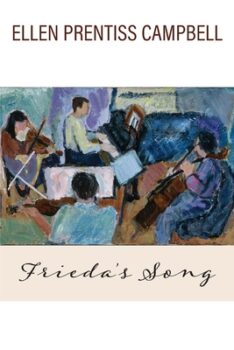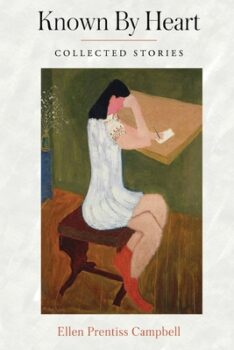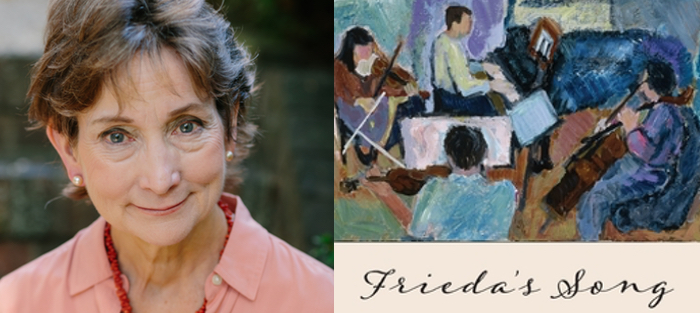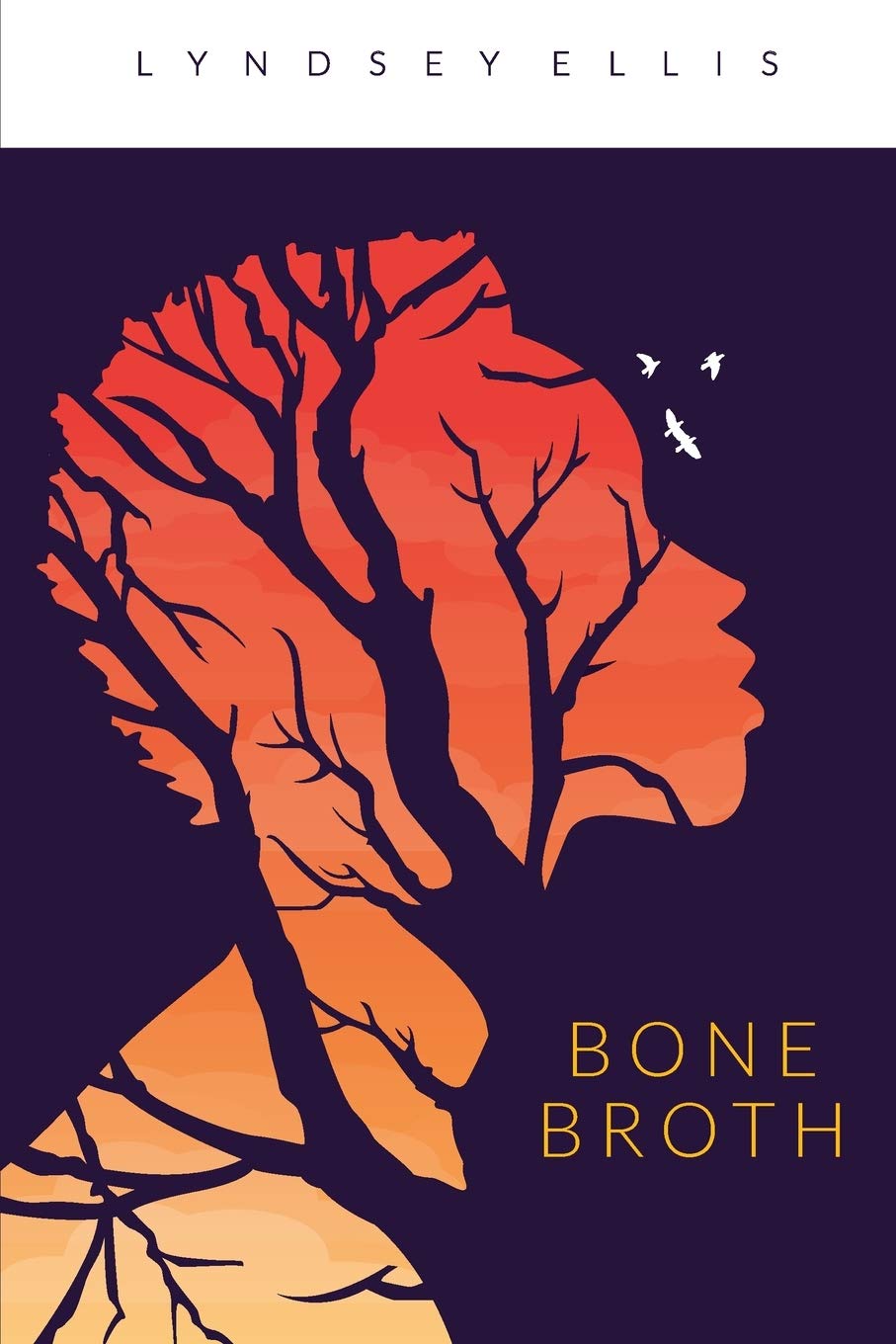It’s 1935. Frieda Fromm-Reichmann, recent European refugee and notable psychiatrist, has resettled in Maryland. As she tries to reestablish herself and her therapeutic practice, Frieda lives in fear for her Jewish relatives back in Germany. Daily, she copes with the sting of a failed marriage, and the sorrow—due to a medical condition—of not being able to bear children. Listening to patients is Frieda’s greatest passion, and she fears for this, too: her hearing is on the rapid decline.
Seventy-four years later, single-mother and psychotherapist Eliza Kline lives in Frieda’s old cottage on the grounds of Chestnut Lodge, the now-abandoned hospital Frieda helped to establish. Eliza, unhappy in her job at a nearby clinic (she’d prefer the freedom of private practice) hangs on for medical insurance and a predictable paycheck, wanting a stable life for her troubled teenage son, Nick.
Eliza, like Frieda before her, has some unhappy secrets of her own. She confides in Frieda’s portrait (mounted prominently in the cottage), appealing to her fellow healer for inspiration in dealing with Nick’s increasingly risky behaviors. When Eliza discovers Frieda’s diary in a forgotten, enclosed space in the cottage, a relationship opens across time and space, bringing Eliza into Frieda’s tenderly tragic world where grief and despair mingle with an intense calling to care for others.
Interview:
Dorothy Reno: Your practice as a psychotherapist would have brought you into contact with Frieda Fromm-Reichmann’s work going back to your early training as a clinician. But this isn’t your only connection: in the acknowledgements of Frieda’s Song, you write that you lived near Chestnut Lodge and were close enough to smell the smoke in 2009 when it burned down. Now that you’ve written a novel reimaging Dr. Fromm-Reichmann’s most personal thoughts, I think it’s safe to say she’s known by heart. What does the work of Fromm-Reichmann teach us about psychology? And what does her life teach us about how we might go about living our own lives?
Ellen Prentiss Campbell: As I’ve been living with her for about ten years, your saying I know Frieda “by heart” is apt. And I must stress, for me Frieda and her lessons are known most intimately by heart rather than mind—though both are important, and co-exist. Perhaps it is like the way the influence of a real-life teacher or mentor becomes embedded in our psyche. The content of those lessons matter, but what is most enduring is the felt and remembered relationship, the tone and manner by which the instruction was conveyed. The question of what Frieda’s work teaches us about psychology, about mental health and illness, about treatment, is too big for me to presume to answer. I do believe her belief in the power of relationship, the healing potential of listening and caring, remains a bedrock principle of many schools of thought and treatment. The field remains one where illness and health are relative, and outcomes are more difficult to define and measure. Now, of course, there are more treatment resources, and an ever-deeper body of knowledge—both very good things. I believe it remains a field where science and art must mix, where both data and craft matter.
Frieda believed loneliness was at the root of mental distress. And that is where the importance of relationship and relationships comes in. There, especially, I believe Frieda still speaks to us today. What her life teaches us about how we might go about living our own life is also a question I must answer, but with qualification. I have come close to Frieda through both research and imagination, but my understanding is created by a hybrid of study and intuition, as a novelist coming to know her character. Her life is the springboard for her fictionalized experience in my story. As I understand her, in both my head and my heart, I believe her life reminds us to be brave, and to reach out to one another. To care for one another. And to care for The Other, who may appear different, frightening, vulnerable.
Throughout Frieda’s Song we follow the experiences of Frieda and Eliza down different timelines (1935 and 2009 respectively, and briefly, 1992) with Nick’s perspective (Eliza’s sixteen-year-old son) appearing as well. Can you say more about how Nick’s story evolved and why it was important to include it?
 I always write character-driven fiction, long or short. I don’t recognize at first—and sometimes may never—why a particular character attracts me to write about him, nor what she may represent.
I always write character-driven fiction, long or short. I don’t recognize at first—and sometimes may never—why a particular character attracts me to write about him, nor what she may represent.
Originally, Frieda’s Song began as a short story, Eliza’s story, the story of Eliza and the most important relationship in her life—the fraught, fretful relationship with her sixteen-year-old son, Nick. Nick was the beloved, painful thorn in her side. She suffers from the parental condition which my friend poet and novelist Jane Rosenberg La Forge brilliantly terms “custodial terror.”
In the original story, which took place over just about twenty-four hours, Eliza’s apprehension of the degree of Nick’s difficulties is dawning and she is increasingly aware of the unwitting ways she has failed him. She is furious at him and herself, and she is frightened for him. In that initial short story, neither Frieda nor Nick were point-of-view characters.
It was Nick who first demanded to be included. He began to speak to me, demanded I listen and speak for him. I actually have to speak it aloud as I am writing (typing on a keyboard, in my case). I work alone, or with my door shut! And you know—when I am writing a character, if I’m getting it right, it really is a little like the experience of listening deeply, behind closed doors, as I used to do as a therapist, to the private voice of a client sharing his story. Nick’s voice grew clear and louder, demanded to be included because he is the most important person in Eliza’s world, and she doesn’t understand him—and her whole self-concept, her personal and professional m.o., is bound up in believing she can understand the other. Only Nick knew what he really was doing; he doesn’t understand himself fully any more than anyone does, but only Nick was immediately experiencing what was really going on with him. His mom can imagine where he’s going, what he’s doing, the danger he may be in, but Nick’s the one who must speak for himself and be heard by the author and the reader.
To some extent, Eliza idealizes Frieda as all knowing, and to some extent Frieda idealizes what is for her the imagined experience of being a parent. Nick, confused and hurting though he is, cuts through the idealizing, the way honest, brash, angry adolescents do. He’s all action, not contemplation. Once he was speaking to me—or shouting, as he blew by me on his skateboard—I had to listen. Now I think his energy, his pace propelled me to keep writing, to figure it out. You know, I went back to the Lodge recently to take some pictures. I turned in the gates, and there were three boys with their skateboards flying down the drive. Waiting for me or coming for me?
Previously, you mentioned Frieda thought loneliness was at the core of psychopathology. This comes through in how you’ve written her character, especially when she begins referring to her patients as “my lonely ones.” I’ve been pondering this in light of Eliza’s journey. Eliza’s trying valiantly to be a whole, adequate parent for her son who doesn’t have a father. But underneath her despair about protecting Nick, she also seems desperately lonely. Could Eliza be confused about what’s really bothering her?
Dorothy, yes. Eliza is certainly confused. Not so much about “what is really bothering her” as confused about the way Nick’s distress is his own, as well as how it is also partly caused by and reflects her own distress. Eliza is desperately lonely, as is Frieda in the novel. (Remember, always when I speak of Frieda, it is “my” fictional Frieda). Neither Eliza nor Frieda sees herself whole, or clearly. But who does? It’s that blind man and the elephant phenomena—we really are only able to “see” what we put our hand on. It’s also easier for Eliza to reckon with, or try to address, the pain and peril she discovers her son is in than to really accept her own distress, and their separateness. Part of it is personality, with both Eliza and with Frieda. Part of it is the profession, the professional role Eliza has chosen and been shaped by. Eliza knows Frieda warns therapists to be aware, and wary, of their own loneliness, their own needs. But there’s that partial disconnect for Eliza, as for Frieda, as for most of us between theory and understanding on a personal, cellular level what’s going on for us.
There are many themes in Frieda’s Song, one of them being the power and penalties of surrogacy. Frieda is not able to have children, and although she loves her husband passionately, they divorce. Nevertheless, she forms a deeply satisfying friendship with Gertrude Jacob, who becomes family to her. Later, and perhaps somewhat alarmingly, she begins to view her patients at Chestnut Lodge as her children. In Nick’s timeline, there’s a couple down the street (Phil and Ben) who become father-figures. And Eliza, of course, has Frieda’s secret diary as a surrogate mentor. What struck me is how the character’s relationships with their “surrogates” come out richer and more satisfying than with the original subjects of desire. Does this tell us something about the possibilities of alternative family structures?
Yes, Frieda may substitute her passionate friendship, her passion for her work, for her original and unfulfilled desire to have a child. And yes, Nick transfers some of his yearning for a father onto his relationship with Ben and Phil. And yes, Frieda’s diary, Frieda’s voice and presence conveyed through the diary, does serve as a mentor for Eliza. But I balk at the customary, somewhat negative, second-best connotation of surrogate as “substitute,” from the Latin, and I like your query about what these satisfying relationships suggest is possible in terms of meaningful alternatives. These may be alternative relationships, but not second best or substitutes—just as adoptive parenting is as real as biological. One of many things I learned from my clients over my years as a therapist, from my elderly clients, in particular, is friendship is essential and sustaining, particularly over the course of long lives when we outlive, or lose in other ways, many we love. Extensions of traditional family structures are not just possible but necessary.
 It’s worth mentioning Frieda’s Song has a lot of themes in addition to surrogacy. You take on some big ones! The theme of “Lost Happiness” comes through with Frieda’s playing Mendelssohn’s famous song by the same name. How does loss impact Frieda’s character as the story progresses?
It’s worth mentioning Frieda’s Song has a lot of themes in addition to surrogacy. You take on some big ones! The theme of “Lost Happiness” comes through with Frieda’s playing Mendelssohn’s famous song by the same name. How does loss impact Frieda’s character as the story progresses?
Frieda endures such loss: her native country, the hospital she founded, friends and colleagues killed in the camps. And although her immediate family survived, she never lived with them again. Her marriage ended. She became deaf. But what a spirit! What strength. She put down roots, made a life, left an incredible legacy. Her resilience makes me think of one of my favorite poems, Elizabeth Bishop’s “One Art.” It’s a litany of loss—but also going on. I think the cumulative losses, particularly of loved ones and her hearing, wore Frieda down. Even rocks crumble, as they say. But what joy she took in work, friendship, music, art. I see her life as a victory.
This story is populated by psychotherapists and steeped in the language of care and healing. Interestingly, there’s little actual therapy in the novel. Did you make a conscious decision to leave it out?
I make so few conscious decisions when I am writing! Not a good thing or a bad thing, just the way it is for me. Yes, there are only a few partial scenes inside either Frieda or Eliza’s offices. In retrospect, I suspect at least a couple of reasons. Oddly, one may be related directly to my years of working closely and confidentially with clients. Revealing a client confidence is not only against professional ethics, it’s against my nature. So opening the door to a therapy session, even on the page, feels a little transgressive. I remember as a student being very upset when we observed interviews, despite patient consent. It felt wrong. Perhaps another reason I held back from offering scenes of Frieda or Eliza working with patients is that I don’t believe I could pin the process of therapy to the page. Couldn’t adequately describe it without making a sometimes almost mystical experience about as interesting as watching paint dry. Maybe it would be something I would attempt, if I hadn’t practiced. Or maybe it’s just a block I have. Maybe I should see a therapist.
I like your sense of humor, Ellen. It’s been said that writers will typically have a subject or topic they keep returning to. Have you identified yours?
Dorothy, I think underneath, my braided subject is love, and loss, and memory. I’ve read that we do not consciously remember until we have language, although we certainly remember and bear the imprint of pre-language experience. But when we can read, and even more so when we can write, language becomes a powerful tool to capture and hold onto and share experience—of the senses, of places, of people, of kindness and cruelty, injury and healing. I started writing fiction again almost twenty years ago, after a long break, in response to sorrow and loss, and sometimes have found in the process—joy. As you know, I don’t write memoir or autobiographical fiction. I love making things up, imagining, filling in the dots. But I think it is all in service somehow to those branded strands: love, loss, memory. I’m so glad to be writing. As Ovid says, sing your song now, you cannot take it with you when you go.






